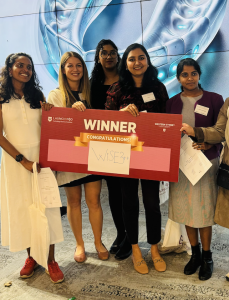As a former APR intern with the Australian Academy of Science, I was invited to attend the Women in STEM Masterclass from October 21-23 at Western Sydney University. While I attend many women in STEM events with high hopes for a renewed sense of direction in my career, I am usually met with the same motivational speeches reiterating the underrepresentation of women in STEM leadership roles. Typically, such events end with a call to action for women to be more confident and adopt a “go getter” attitude to their careers (important, but not all that helpful!). I was immediately struck by how different this event felt. It provided a dynamic snapshot of various industries and job roles, offering practical advice and real-life examples of pathways into such careers.
It was a space where meaningful connections were made on the spot—connections that are essential for career growth.
One speaker noted that while “hard work is important, it is not enough” when it comes to driving career growth, emphasising the necessity of networks, mentors, and role models. This theme echoed throughout the masterclass, where we were encouraged to think beyond doing good work and to actively form and seek out relationships and networks across industries. What made this experience truly unique was the diversity of fields represented—data analytics, entrepreneurship, academia, project management, policymaking, and more. I found myself able to visualise new roles I hadn’t previously considered and better understand how my skills align with these opportunities. I also learned about available programs that support commercialisation and innovation, giving me new confidence in taking the next steps in my career.
A particularly valuable aspect of the masterclass which I resonated with, was learning about the skills and insights other PhD students gained from their APR-internships. In particular, they highlighted how these experiences provide PhD students with more than just research skills; they offer project management expertise, business acumen, and a behind-the-scenes look at career opportunities outside of academia. These internships lift the veil on roles and industries that PhD candidates might not have considered, expanding views of possibilities. This resonates with the growing recognition that doctoral training can and should equip students with transferable skills that are applicable across various sectors, preparing them to excel in a rapidly evolving job market.
As a former APR intern, I truly think every PhD should have an opportunity to experience and an internship placement.
The masterclass also introduced a refreshing perspective on the concept of “impact.” Impact is something that I find myself thinking about more and more within the academic setting, and it was validating to hear my thoughts echoed by my peers. For many academics, impact is often (primarily) defined by publications and citations in high-impact journals. But this event encouraged us to redefine what impact means, placing a greater focus real-world problems that matter to people. This shift in thinking resonated with the idea of “falling in love with the problem, not the solution”—a principle of design thinking that emphasises understanding the needs of the end-user before devising solutions. This approach fosters innovative solutions that have a meaningful impact beyond the academic sphere. This resonated with me; in my research, what drives me is the benefit I can offer to patients/society, not a publication in Nature (though that would be a bonus!).
Day three of the masterclass was a highlight, featuring an exciting Hackathon challenge where attendees were separated into teams to put their innovation skills to the test. Each team was tasked with identifying a problem—one they could truly “fall in love with”—and then leveraging the diverse skill sets within their group to develop creative solutions. This challenge embodied the spirit of design thinking, emphasising the importance of understanding the problem deeply before attempting to solve it. Throughout the day, we worked collaboratively, brainstorming ideas, using radical innovation strategies, and refining our “pitch” approach for the judging panel. The ideas presented were incredible given the time constraints, highlighting truly “fall in love-able” problems. Cash prizes were on the table for an extra sense of motivation! The Hackathon’s hands-on, high-energy experience brought the masterclass lessons to life, reinforcing the value of diverse perspectives, collaboration, creativity, and problem-centred thinking in STEM. I was lucky enough to be on the winning team, which was the cherry on top of an incredible conference.
 By the end of the masterclasses, I felt a renewed sense of direction, equipped with new skills, goals, and connections for my career. It was an experience that didn’t just inspire but gave me the tools to make tangible progress. I left with a deeper understanding of what it means for my work to have an impact, and new network of people to help me pursue career goals in a variety of settings. This masterclass was not a one-off for me—I will be returning, knowing that each time, I’ll leave with more insights, confidence, and opportunities.
By the end of the masterclasses, I felt a renewed sense of direction, equipped with new skills, goals, and connections for my career. It was an experience that didn’t just inspire but gave me the tools to make tangible progress. I left with a deeper understanding of what it means for my work to have an impact, and new network of people to help me pursue career goals in a variety of settings. This masterclass was not a one-off for me—I will be returning, knowing that each time, I’ll leave with more insights, confidence, and opportunities.


